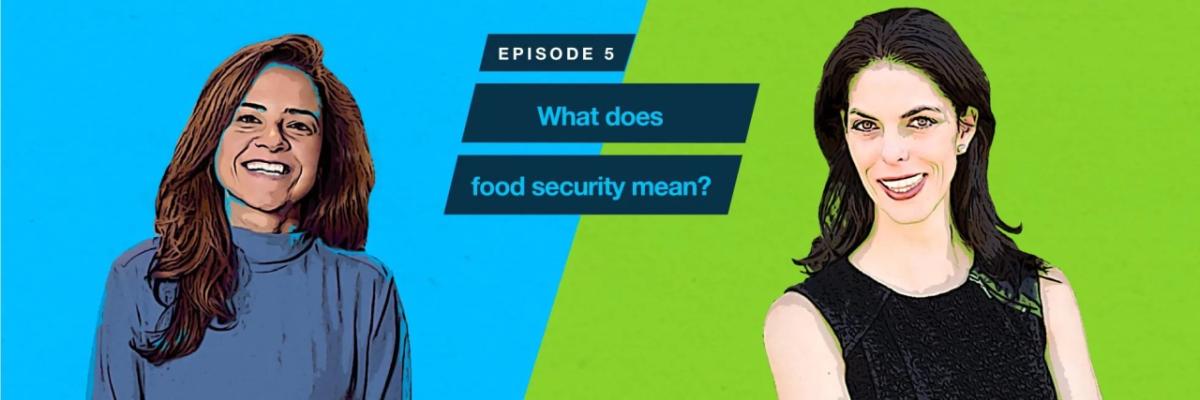Headlines of the Future: The State of Food Security
Episode 5: The State of Food Security

Audio File
The war in Ukraine has compounded the pressure that Covid-19 and climate change has already put upon our strained food systems, with the UN World Food Program calculating that 283 million people are currently facing acute hunger and 45 million teeter on the verge of starvation. It’s estimated that increased stress on food systems could lead to more than 500 million people facing acute hunger in the next year.
In the fifth episode of Headlines of the Future, we discuss the state of global food security on the background of the tragedy in Ukraine. Julia Borlaug, President of the Borlaug Foundation and Natasha Santos, Head of Global Stakeholder Affairs and Strategic Partnerships at Bayer Crop Science, share their insights into what impact the current conflict is having on the global food supply chain, and what role science and innovation could play in strengthening our food systems and preventing long-term shortage.
For more information, download the transcript of this episode here.
- Around 400 million people globally are dependent on Ukraine and Russia for food. From grains like wheat and corn to poultry, cooking oils and dairy. Furthermore, many of the raw materials used in fertilizers essential to global harvests, come directly from Russia. (Source: World Food Program)
- Ukraine is one of the four main corn exporters in the world, but it is also known as “the granary of Europe” in terms of cereals and flour. The two countries also account for about 50% of the world’s sunflower oil exports and 25% of its wheat. (Source: Time)
- Higher prices threaten to place a significant strain on developing nations like Bangladesh, Sudan, and Pakistan, which in 2020 received half or more of their wheat from Russia.
- Nearly one in three people in the world (2.37 billion) did not have access to adequate food in 2020. (Source: UN)
"To feed the Ukrainians who have no food it's a really complex matter that just goes beyond research. And I know a lot of people look at it and say, well, we have enough wheat why can't we get it there? Well distribution, getting places to don't have roads. There's a lot of complexities, as I said, and with 30% of the wheat supply now, no longer in the markey, it's devastating for all."
Julie Borlaug, President of the Borlaug Foundation
Julie Borlaug is President of the Borlaug Foundation, a non-profit that continues the legacy of the late Dr. Norman E. Borlaug in the fight against global hunger and extreme poverty through international agricultural development. Dr. Norman Borlaug won the 1970 Nobel Peace Prize for his work preventing mass hunger and starvation in Mexico, India, and Pakistan. In these countries, Dr Borlaug. saw that food insecurity acted as a principal cause of violence and civil unrest, and that peace could be secured through agricultural development and science. As his granddaughter, Julie Borlaug continues this family legacy in her role as President, her role as Vice President of Corporation Communications and Public Relations at Invaio Science, and as an Advisor for the International Maize and Wheat Improvement Center.
"It's a humanitarian catastrophe that, in the short term, needs to be looked at as it is - a humanitarian catastrophe. All efforts should look at that. When you think about immediate impacts on other countries...there are countries that are highly dependent, so I think in the short term, that's the area we want other organizations to support as well."
Natasha Santos, Vice President of Global Stakeholder Strategy & Affairs at Bayer's Crop Science
Natasha Santos is Vice President and Head of Global Stakeholder Strategy & Affairs at Bayer’s Crop Science Division. An accomplished senior public affairs executive with over 17 years of experience in the agriculture, food and life science industries, Natasha has actively promoted corporate reputation and enhanced stakeholders’ relations in companies such as BASF, Mars Incorporated, and since 2014, Bayer AG. Through harnessing the combined knowledge, relationships, and resources of public and private sectors, she knows it is possible to give innovative farmers greater access to the pioneering new farming techniques. From digital tools to smarter business models, Bayer supporters farmers to grow their livelihoods into profitable, climate-smart farming business and transform food systems sustainability.
Headlines of the Future is available everywhere you stream your favorite podcasts, or you can listen to it right here.
Apple Podcast | Spotify | Google Podcasts | Podbean
View original content here.

